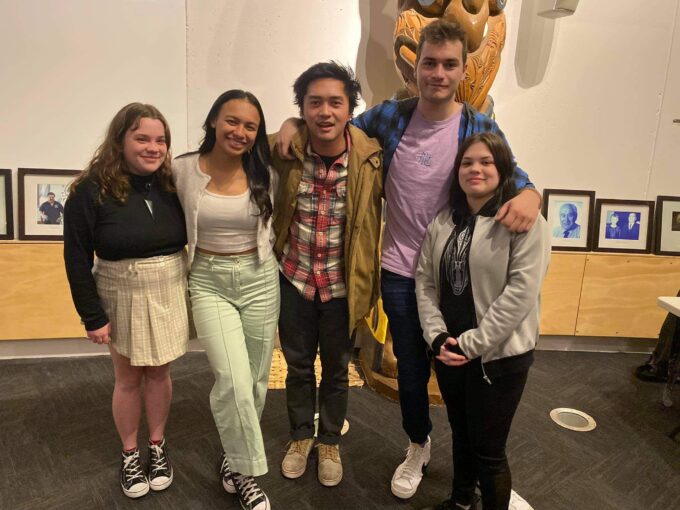
Team ROYO
<h2>A tech-focused group of first-year Māori students from Ara have designed an app to improve the process for youth seeking their first job, by meeting them on the digital playing field they’re familiar with.</h2>
<p>As Team ROYO (Rangatahi Opportunities/Youth Opportunities), the five students came together for the Programming Māori Potential (PMP) digital start-up accelerator and won the South Island regionals with their smart solution to connect youth to work experience.</p>
<p>&#8220;There&#8217;s a big need for businesses to find young people to bring in; skilled or unskilled, wanting to learn, or having a passion for the industry, and it&#8217;s a struggle for young people to find a place where they can get experience,&#8221; says team member, Eli Pohio.</p>
<p>Through the PMP programme, 115 rangatahi Māori from across New Zealand go head-to-head, using hackathon and design thinking methodologies to identify and solve big community issues using tech solutions, and then turn those solutions into viable business prototypes.</p>
<p>Team ROYO saw a gap in the market for a platform where rangatahi could move away from the limits of traditional CVs, to create more personalised digital profiles, including video resumés and supporting attachments.</p>
<p>&#8220;We&#8217;re trying to make CVs irrelevant,&#8221; says Pohio &#8220;I went on to Reddit recently and asked hirers how many CVs they look at, out of all of the ones they receive. On average, they read two out of a huge pile!&#8221;</p>
<p>&#8220;And it&#8217;s even harder for us because, obviously companies want experience, but how do you expect experience from people who are at school all day?&#8221; says Lizzie Keele, whose sister Allie in the group, is going into year 13 at Avonside Girls’ High School.</p>
<p>Faced with this knowledge, and the age-old experience vs job conundrum, the group developed their vision to help youth gain work experience by highlighting their personalities and skills digitally.</p>
<blockquote>
<p>&#8220;Using traditional CVs to apply for jobs is becoming outdated. If you’re an artist, you can show what you can do,&#8221; says Lizzie Keele.</p>
</blockquote>
<p>Across the 10-week programme, 17-19 year olds are immersed in the world of innovation and make valuable connections with industry leaders, mentors and entrepreneurs &#8211; including Chante Hakiwai, PMP Lead from HTK Group, the organisation that founded the ‘PMP’ initiative.</p>
<p>&#8220;I think it&#8217;s really important for our young people to have a voice and have the opportunity to create solutions that are meaningful to them,&#8221; says Hakiwai.</p>
<blockquote>
<p>&#8220;A lot of solutions that these intelligent rangitahi come up with are aimed at young people, but they’ll actually benefit the wider community &#8211; they&#8217;re intergenerational solutions.&#8221;</p>
</blockquote>
<p>Out of all the groups involved in the PMP initiative, 16 digital prototypes were created around important issues from housing, to mental health, to jobs. Three other teams have raised capital for their concepts and other teams are in conversations to seek funding from potential investors.</p>
<p>Following their PMP regional win, ROYO received investment of up to $100,000 and then reached out to Ara’s Tech Colab for the tech expertise to begin app development.</p>
<p>&#8220;Now we’ve got a possible employment opportunity with our investor,&#8221; says group member Kiisha-Rose Woodhouse. &#8220;The offer we&#8217;ve received is amazing, life changing really. They believe in our ideas and they&#8217;re offering us awesome resources and training to be able to grow our own business.&#8221;</p>
<p>Tech Colab paired the team up with Ara graduate, Aditya Raj, who helped ROYO build an MMP (minimal marketable product) which they can now use to showcase their idea to other funders and investors.</p>
<p>ROYO are currently seeking other investors to build the next phase of their app and turn their concept into reality.</p>
<p>Following the programme group member Lizzie Keele was inspired to study at Ara and is looking to apply for a Diploma in Business. Hakiwai views this as a great outcome for the PMP programme.</p>
<p>&#8220;The thing about PMP is we don&#8217;t just cut off support after the 10 weeks and say ‘see you later’, we work with these young people on their next steps,&#8221; Hakiwai explains.</p>
<p>&#8220;By partnering with Ara this has helped participants like Lizzie reach a point where they felt comfortable enough to step into that space, as prior to the program many didn&#8217;t see themselves in tertiary. A lot of them are coming to Ara now, for that fact that they feel like they belong here. So that&#8217;s a really impactful difference.&#8221;</p>
<p>Ara Institute of Canterbury, along with ChristchurchNZ, Datacom, Microsoft NZ and Te Pūtahitanga o Te Waipounamu are Regional Partners of Programming Māori Potential. The Ministry of Business Innovation and Employment is a national Strategic Partner.</p>

Teacher guide for the new PAT tuhituhi | writing assessment for Years 5 to 10…
Banning AI won’t cut it, says one science teacher. So how can schools and teachers…
Are stressed teachers contributing to the dysregulation we see in classrooms? Rebecca Thomas asks in…
Henbury School Principal Sarah Corry offers a candid, heartfelt insight into leadership burnout, resilience, and…
For many of us, calling our teachers by their first names would have been unthinkable.…
NZEI Te Riu Roa is considering legal action against the government for the disestablishment of…
This website uses cookies.